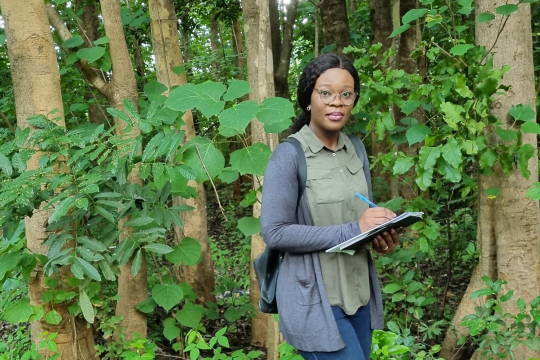Meet Chizoba Obianuju Oranu, EfD Nigeria! She tells us about her first approach to environmental economics and the importance of having a mentor. She also shares the results of her research project about deforestation in Malawi and some advice to future young researchers.
Why did you want to pursue an academic career?
I like teaching a lot. When one teaches, you can have a long-term impact on students, which I find very exciting. Through research, one gets new knowledge regularly, which satisfies your intellectual curiosity. So for me, pursuing an academic career in agricultural economics is like converting my passion into work.
Why did you choose environmental economics?
During my undergraduate studies in the Department of Agricultural Economics at the University of Nigeria, Nsukka, I was sure I would specialize in Agricultural Marketing because I saw Environmental Economics as very abstract. However, during my master’s program, I took a course in Environmental Economics and got interested. In my master’s thesis, I tried to relate Environmental Economics to Agricultural Marketing. My thesis was A comparative study on the effect of climate variability on prices on maize in Bako, Ethiopia, and Ogun State, Nigeria. For my Ph.D. studies, I am now majoring in Environmental Economics. Dr.Nnaemeka Chukwuone, the EfD Nigeria Director, is a very good mentor and has made the transition from Agricultural Marketing to Environmental Economics easy. He always provides me with articles, books, information on workshops, and other things that help me in environmental economics. He has indeed been very supportive.
One of the things I like about Environmental Economics is that it cuts across many areas, such as climate change, forestry health, politics, and law, to mention a few. This makes it very interesting. Besides, coming from a developing country, you cannot talk about development without mentioning the environment. Specializing in Environmental Economics is one of the best decisions I have made in my academic career.
What are you passionate about?
I am passionate about research because it enables me to gain a better understanding of any area of interest. It is quite fascinating to share knowledge gained from research through participation in conferences, article writing, and teaching in the classroom. I particularly like collaborative research and that is something I really appreciate about the EfD initiative. It allows researchers to work together and share knowledge with researchers from other parts of the world.
Why are you interested in deforestation in Malawi?
The high rate of deforestation in Malawi is one of the biggest threats to Malawi’s environment. Approximately, 97% of Malawian households rely on wood fuel as their primary source of cooking.
Besides, Malawi is also among the poorest countries in the world, and many studies have shown that there is an interrelation between poverty and dependence on forests. We concluded in our research on “The implication of COVID-19 on forest in Malawi” that the COVID-19 pandemic will lead to increased deforestation and forest degradation if mitigation measures are not put in place. This is because the COVID-19 pandemic has led to a decline in income in some households, which will invariably result in increased dependence on forest resources for food supply and cooking fuel.
What are your future plans?
Currently, I am on study leave from the University of Nigeria. Once I finish my Ph.D. studies in Malawi, I plan to go back to work at the University of Nigeria and focus on teaching and research.
I am pursuing my Ph.D. in Agriculture and Resources Economics at the Lilongwe University of Agriculture and Natural Resources (LUANAR) in Malawi. My research is focused on the relationship between smallholder farmers and deforestation in Nigeria. I am very fortunate to be under the supervision of Professor Charles Jumbe, who is a Director at the Centre of Agriculture Research and Development in LAUNAR. He has helped me enormously improve my research skills. Also, Nnaemeka Chukwuone from the Nigeria end has been very supportive.
Do you have some advice for others who are considering following your path?
As a young researcher coming from a developing country, there are two challenges: finding funds and mentorship. Capacity building is important, but if you don’t have funds, you cannot do good research. Also, if you don’t have a good mentor, you might face a lot of struggles.
It is also very important for young researchers to define their goals clearly. Then, they have to stay focused, convince themselves that these goals are achievable, and pursue their goals passionately. It is also important to have a good research network, to carry out collaborative research and share ideas.
In my case, being away from home for my Ph.D. studies has been very difficult, particularly during the COVID lockdown. It was a hard time for me in Malawi, during the COVID pandemic global lockdown, because it was surrounded by a lot of uncertainty. The thought of not being sure when I was to go back home was distressing. However, amidst the COVID pandemic, I was determined to pursue my career goals. I consider myself very lucky to have Prof Charles Jumbe and Nnaemeka Chukwone as mentors, as well as a supportive family because they all encouraged me to keep going and stay very focused on my research.
By: Manuela Fonseca.
